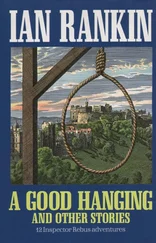“I suspect,” she said, “that before long there won’t be no more niggers on this place. And I tell you what. I’d rather have niggers than them Poles. And what’s furthermore, I aim to take up for the niggers when the time comes. When Gobblehook first come here, you recollect how he shook their hands, like he didn’t know the difference, like he might have been as black as them, but when it come to finding out Sulk was taking turkeys, he gone on and told her. I known he was taking turkeys. I could have told her myself.”
Mr. Shortley was breathing softly as if he were asleep.
“A nigger don’t know when he has a friend,” she said. “And I’ll tell you another thing. I get a heap out of Sledgewig. Sledgewig said that in Poland they lived in a brick house and one night a man come and told them to get out of it before daylight. Do you believe they ever lived in a brick house?
“Airs,” she said. “That’s just airs. A wooden house is good enough for me. Chancey,” she said, “turn thisaway. I hate to see niggers mistreated and run out. I have a heap of pity for niggers and poor folks. Ain’t I always had?” she asked. “I say ain’t I always been a friend to niggers and poor folks?
“When the time comes,” she said, “I’ll stand up for the niggers and that’s that. I ain’t going to see that priest drive out all the niggers.”
Mrs. McIntyre bought a new drag harrow and a tractor with a power lift because she said, for the first time, she had someone who could handle machinery. She and Mrs. Shortley had driven to the back field to inspect what he had harrowed the day before. “That’s been done beautifully!” Mrs. McIntyre said, looking out over the red undulating ground.
Mrs. McIntyre had changed since the Displaced Person had been working for her and Mrs. Shortley had observed the change very closely: she had begun to act like somebody who was getting rich secretly and she didn’t confide in Mrs. Shortley the way she used to. Mrs. Shortley suspected that the priest was at the bottom of the change. They were very slick. First he would get her into his Church and then he would get his hand in her pocketbook. Well, Mrs. Shortley thought, the more fool she! Mrs. Shortley had a secret herself. She knew something the Displaced Person was doing that would floor Mrs. McIntyre. “I still say he ain’t going to work forever for seventy dollars a month,” she murmured. She intended to keep her secret to herself and Mr. Shortley.
“Well,” Mrs. McIntyre said, “I may have to get rid of some of this other help so I can pay him more.”
Mrs. Shortley nodded to indicate she had known this for some time. “I’m not saying those niggers ain’t had it coming,” she said. “But they do the best they know how. You can always tell a nigger what to do and stand by until he does it.”
“That’s what the Judge said,” Mrs. McIntyre said and looked at her with approval. The Judge was her first husband, the one who had left her the place. Mrs. Shortley had heard that she had married him when she was thirty and he was seventy-five, thinking she would be rich as soon as he died, but the old man was a scoundrel and when his estate was settled, they found he didn’t have a nickel. All he left her were the fifty acres and the house. But she always spoke of him in a reverent way and quoted his sayings, such as, “One fellow’s misery is the other fellow’s gain,” and “The devil you know is better than the devil you don’t.”
“However,” Mrs. Shortley remarked, “the devil you know is better than the devil you don’t,” and she had to turn away so that Mrs. McIntyre would not see her smile. She had found out what the Displaced Person was up to through the old man, Astor, and she had not told anybody but Mr. Shortley. Mr. Shortley had risen straight up in bed like Lazarus from the tomb.
“Shut your mouth!” he had said.
“Yes,” she had said.
“Naw!” Mr. Shortley had said.
“Yes,” she had said.
Mr. Shortley had fallen back flat.
“The Pole don’t know any better,” Mrs. Shortley had said. “I reckon that priest is putting him up to it is all. I blame the priest.”
The priest came frequently to see the Guizacs and he would always stop in and visit Mrs. McIntyre too and they would walk around the place and she would point out her improvements and listen to his rattling talk. It suddenly came to Mrs. Shortley that he was trying to persuade her to bring another Polish family onto the place. With two of them here, there would be almost nothing spoken but Polish! The Negroes would be gone and there would be the two families against Mr. Shortley and herself! She began to imagine a war of words, to see the Polish words and the English words coming at each other, stalking forward, not sentences, just words, gabble gabble gabble, flung out high and shrill and stalking forward and then grappling with each other. She saw the Polish words, dirty and all-knowing and unreformed, flinging mud on the clean English words until everything was equally dirty. She saw them all piled up in a room, all the dead dirty words, theirs and hers too, piled up like the naked bodies in the newsreel. God save me! she cried silently, from the stinking power of Satan I And she started from that day to read her Bible with a new attention. She poured over the Apocalypse and began to quote from the Prophets and before long she had come to a deeper understanding of her existence. She saw plainly that the meaning of the world was a mystery that had been planned and she was not surprised to suspect that she had a special part in the plan because she was strong. She saw that the Lord God Almighty had created the strong people to do what had to be done and she felt that she would be ready when she was called. Right now she felt that her business was to watch the priest.
His visits irked her more and more. On the last one, he went about picking up feathers off the ground. He found two peacock feathers and four or five turkey feathers and an old brown hen feather and took them off with him like a bouquet. This foolish-acting did not deceive Mrs. Shortley any. Here he was: leading foreigners over in hoards to places that were not theirs, to cause disputes, to uproot niggers, to plant the Whore of Babylon in the midst of the righteousl Whenever he came on the place, she hid herself behind something and watched until he left.
It was on a Sunday afternoon that she had her vision. She had gone to drive in the cows for Mr. Shortley who had a pain in his knee and she was walking slowly through the pasture, her arms folded, her eyes on the distant low-lying clouds that looked like rows and rows of white fish washed up on a great blue beach. She paused after an incline to heave a sigh of exhaustion for she had an immense weight to carry around and she was not as young as she used to be. At times she could feel her heart, like a child’s fist, clenching and unclenching inside her chest, and when the feeling came, it stopped her thought altogether and she would go about like a large hull of herself, moving for no reason; but she gained this incline without a tremor and stood at the top of it, pleased with herself. Suddenly while she watched, the sky folded back in two pieces like the curtain to a stage and a gigantic figure stood facing her. It was the color of the sun in the early afternoon, white-gold. It was of no definite shape but there were fiery wheels with fierce dark eyes in them, spinning rapidly all around it. She was not able to tell if the figure was going forward or backward because its magnificence was so great. She shut her eyes in order to look at it and it turned blood-red and the wheels turned white. A voice, very resonant, said the one word, “Prophesy!”
She stood there, tottering slightly but still upright, her eyes shut tight and her fists clenched and her straw sun hat low on her forehead. “The children of wicked nations will be butchered,” she said in a loud voice. “Legs where arms should be, foot to face, ear in the palm of hand. Who will remain whole? Who will remain whole? Who?”
Читать дальше









